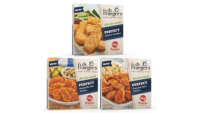Eggs Plus Plants: The Perfect Pair
The whole is greater than sum of its parts

PHOTO BY KATHLEEN ZELMAN / COURTESY OF AMERICAN EGG BOARD (WWW.AEB.ORG)

PHOTO COURTESY OF AMERICAN EGG BOARD (WWW.AEB.ORG)


All the major indicators point upward for plant-based formulating and product introductions.
Technomic data shows that 24.9% of foodservice operators menu plant-based protein with predictions of 27.7% in two years’ time, by Q3 2021. Datassential research shows 22% of consumers “embrace” a flexitarian diet, consuming meat some of the time, but mixing it up with more plant-based options. Even more, a glance at one menu item, vegetarian burgers, shows demand increasing 29% between 2014 and 2018 (NPD Group).
Keeping It Real
Flexitarians and those who embrace plant-based formulating tend to favor authentic ingredients and minimal processing. The CEO of the Hartman group as quoted in Ad Age said, “Successful brands…think about modern food culture and this compelling desire on the part of consumers to have real foods that don’t seem overly processed or produced.”
Eggs certainly fit into consumer perceptions of “real,” with 94% of U.S. households reporting they purchase eggs for use at home. Due to the multiple functional properties that eggs supply to formulators, egg products can help keep labels shorter and ingredient names more familiar. For decades, formulators have relied on egg ingredients for thousands of application scenarios. This includes a long history of use in vegetarian foods.
Egg ingredients not only present manufacturers and consumers alike with an economical source of protein, they offer great taste—still the primary purchase consideration for any food or beverage. Eggs also offer incredible versatility. Whether a visible presence in a handheld breakfast burrito, sandwich or salad, playing a primary role in a quiche, frittata or shakshuka, or playing a supporting role in the background to bind, emulsify or aerate, eggs fit into vegetarian formulations in a variety of ways.
Egg inclusion as an ingredient can help supply products with a smooth mouthfeel, clean flavor and more complete nutritional profile. Consumers do expect plant-based foods to deliver on health and nutrition. One recent survey showed 41% of consumers said that having a product with a high level of protein is important, while many also said a product’s nutritional profile is of concern. Almost one-third prioritize natural ingredients.
One large egg is a source of high-quality protein, supplying 6g of protein. In addition, one egg is a good or excellent source of eight essential nutrients as well as 252 mcg of the carotenoids lutein and zeaxanthin, all for 70 calories.
Protein Alone or Nutrient Adequacy?
The debate about plant-based foods often focuses on an “either/or” mentality, yet pairings make the most sense nutritionally and fit well within a flexitarian lifestyle.
Animal sources of protein, such as the egg, supply a full complement of the nine essential amino acids the human body is unable to produce, while other plant-based sources often lack one or more. Adding eggs to the formulation is one way to supply this complete protein profile. However, eggs actually go beyond their own nutritional properties and can enhance the absorption of certain critical vitamins.
Adding eggs to a plant-forward dish was demonstrated to improve vitamin absorption. One study found that adding whole eggs to a salad comprised of a variety of vegetables, including leafy greens, increased the amount of vitamin E the body absorbs from the vegetables.
Another study from 2015 showed that adding eggs to a salad increased the absorption of the vegetables’ carotenoids, including alpha-carotene, beta-carotene, lutein, zeaxanthin and lycopene. The absorption of these carotenoids was three- to eight-times higher when the salad included three eggs compared to no eggs at all.
In addition to high-quality protein, eggs are a good or excellent source of riboflavin (vitamin B2), vitamin B12, biotin (B7) pantothenic acid (B5), iodine, selenium, and choline. Most Americans do not reach the Adequate Intake (AI) level for choline, and it is difficult to reach the AI without eating eggs or taking a dietary supplement. Adding eggs to plant-based foods can create a more robust nutritional profile and aid with vitamin absorption.
The plant-based future doesn’t need to be either/or; it can instead be a choice of pairing plant-based ingredients with the nutritional and functional benefits of eggs, so there’s more.
Elisa Maloberti is the Director of Egg Product Marketing for the American Egg Board (AEB), where she has worked for more than 25 years. Elisa has a B.S. degree in Food Science and Nutrition from Dominican University. She is responsible for AEB’s egg product marketing program, which includes advertising and promotions targeting food manufacturers, educational programs and research.
For more information about the unique functionality of eggs, please visit www.aeb.org/food-manufacturers/egg-functionality .
Looking for a reprint of this article?
From high-res PDFs to custom plaques, order your copy today!







